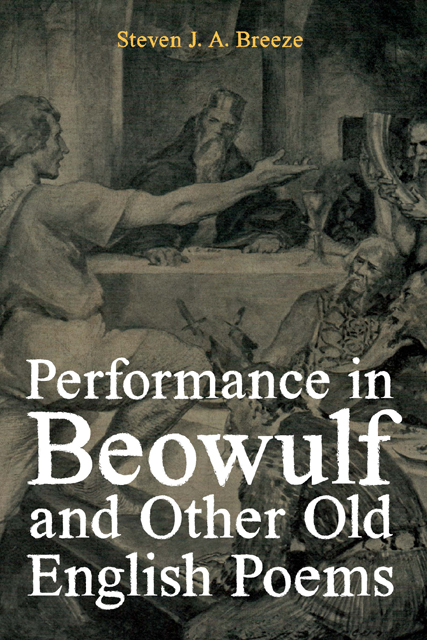Book contents
- Frontmatter
- Dedication
- Contents
- List of Illustrations and Tables
- Acknowledgements
- List of Abbreviations
- Poem Titles, Orthography, Editions, and Translations
- Introduction: Realising the Intangible
- 1 Instruments of the Poet: Exploiting the Old English Lexis
- 2 Multiformity and the Orality of Associative, Architectonic Poetics
- 3 Providence and Pleasure: Performance as Symbol
- 4 Storytelling in Beowulf and Meta-storytelling in Andreas
- 5 Wisdom and Power: Philosophies of Performance
- 6 Theme Songs: An English Tradition of Performance?
- 7 The Lure of the Lyre: Interpretation, Reenactment, and the Corpus
- Conclusion: ‘Poetic Performance’
- Bibliography
- Index
- Anglo-Saxon Studies
3 - Providence and Pleasure: Performance as Symbol
Published online by Cambridge University Press: 20 December 2022
- Frontmatter
- Dedication
- Contents
- List of Illustrations and Tables
- Acknowledgements
- List of Abbreviations
- Poem Titles, Orthography, Editions, and Translations
- Introduction: Realising the Intangible
- 1 Instruments of the Poet: Exploiting the Old English Lexis
- 2 Multiformity and the Orality of Associative, Architectonic Poetics
- 3 Providence and Pleasure: Performance as Symbol
- 4 Storytelling in Beowulf and Meta-storytelling in Andreas
- 5 Wisdom and Power: Philosophies of Performance
- 6 Theme Songs: An English Tradition of Performance?
- 7 The Lure of the Lyre: Interpretation, Reenactment, and the Corpus
- Conclusion: ‘Poetic Performance’
- Bibliography
- Index
- Anglo-Saxon Studies
Summary
The previous chapter demonstrated that Beowulf, the most significant source of information concerning performance in the Old English poetic imagination, represents performance thematically, but diversely. From archetypal scop figures to the characters without identifiers relating to their role as performers, Beowulf depicts a world in which performance is integral to society. Though commonly they are brief allusions, what might be seen as uniform references to performance activity, each in fact has differing purposes and effects. These glimpses of performance in the poem mirror the terse allusions in wisdom poetry, material considered in Chapter 5, with performers represented as positive agents who possess the knowledge and ability to perform effectively. The difference in Beowulf is that these allusions interrelate with the poem’s narrative and structural concerns, implying a close relationship with a type of oral poetics that relied on interrelationships between thematically distinctive yet formally associated material. Moreover, in Beowulf traditional poetic themes are utilised in unique ways, notably for example in the way in which the beasts of battle ‘perform’. Performance’s function shifts too as the poem progresses. Whereas the þegn and the scopas symbolise the social cohesion and successes of the Geats and Danes in the first third, mourners represent social decline after the fifty-year jump, in keeping with the poem’s overall shift in tone. As this chapter will demonstrate, the lyre as symbolic object represents this shift most evidently.
The Lyre as Symbol
Referring to the representation of human society in Beowulf, Tolkien describes the poem’s contrasting environments, represented by the presence or absence of light and music:
at the beginning, and during its process, and most of all at the end, we look down as if from a visionary height upon the house of man in the valley of the world. A light starts – lixte se leoma ofer landa fela [the light shines out over many lands] – and there is a sound of music; but the outer darkness and its hostile offspring lie ever in wait for the torches to fail and the voices to cease. Grendel is maddened by the sound of harps.
Present in two episodes discussed in the previous chapter – the joy in the hall that enrages Grendel and before the tale of the Frisian slaughter, and alluded to by the Geatish messenger at the end of his long speech – the ‘harp’, likely the Germanic round lyre, is the symbolic musical instrument of performance in Beowulf, and in Old English poems more generally.
- Type
- Chapter
- Information
- Performance in Beowulf; and other Old English Poems , pp. 104 - 118Publisher: Boydell & BrewerPrint publication year: 2022

